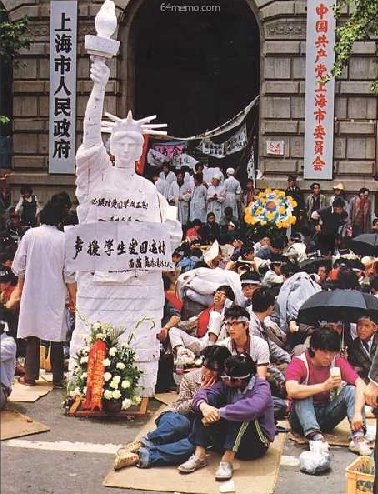This morning I received a request from a reporter I know asking if I could comment on how my Chinese friends and acquaintances were responding, if at all, to the upcoming 20th anniversary. (The reporter was not in China.) I replied that to the best of my knowledge they mostly were not responding at all, because to them there was nothing to respond to. As far as airbrushing June 4 from the collective Chinese psyche is concerned, Mission Definitely Accomplished.
But being thorough and obnoxious, I spent the next hour or so buttonholing people and calling friends and asking them all the same questions: were they hearing any “buzz” about the impending anniversary? Are their friends talking about it? Have they heard of any plans to commemorate the dead?
The answers were unsurprising. June 4 will be a day like any other that will come and go without any particular fanfare. The day is mainly meaningless for them and the event has “been faded from people’s memories,” as one said to me. (I like that used of words, that it’s “been faded,” as though someone had done the fading, not just the passage of time.)
Finally I asked how many of them knew who “Tank Man” was. Out of the 12 or so people I asked, only one – someone who studied in the US – had heard of him. When I asked what images of June 4 they remembered, they said without question it was the photos of burned and/or disemboweled PLA soldiers left hanging by militant protesting workmen.
Once again I marveled at the party, so efficient at some things, so hideously inept at others. I tried to explain the significance of “Tank Man” to a couple of people, but it didn’t seem to register, the anonymous “everyman” holding his shopping bags, and for one insanely dramatic moment capturing the minds and hearts of the world and bringing the military machinery of The Party to a halt. It didn’t work; my friends didn’t seem to understand why it was particularly admirable. The one who knew of him said she wondered why he was so revered. This isn’t because my friends aren’t smart or sensitive; they are both. But our views of what makes a hero are quite different. Again, River Town says it all. The hero would be those who unite people, bring them together and create constructive harmony. It wouldn’t be the lone rebel throwing a monkey wrench into the state machinery.
I understand this, and I was not surprised. One friend said, “Maybe some of the older people here care. My friends and I don’t really know much about it.” I took solace in Alice Poon’s post (courtesy of China Geeks,” which tells us in Hong Kong it’s a bit different, as people react with revulsion to Donald Tsang’s remarks that “economic prosperity” has in effect neutralized the tragedy and caused most Hong Kongers to allow it to drop into the memory hole.
I can still recall the scene in Toronto in which I broke down in tears when I watched TV news while in my brother-in-law’s house – I saw tanks rolling towards Tiananmen Square and the frightened students scrambling to get away, some carrying the wounded on carts. The first thought that came to mind was: “Why on earth are they using tanks to kill those helpless and unarmed young people? Why are the soldiers killing the peacefully demonstrating students?”
Twenty years have passed. Those questions still remain unanswered as of today. Meanwhile, Hong Kong has been able to reap economic benefits from China’s open and reform policy. But most Hong Kongers would never conflate economic prosperity with a serious matter of right and wrong. Tsang could not have made a worse judgment on this issue. Even when the Mainland authorities have been trying to twist the truth around (like laying the blame on the students’ alleged intention to revolt against the CCP – an allegation that is refuted by Zhao Ziyang in his secret memoirs) and to forbid discussions of the subject in the Mainland, this has done nothing to obliterate the shameful deed from Hong Kongers’ memory.
With the passage of time, people’s vehement disgust with the ignominious murderous act has indeed been diluted, as is evident from the declining attendance at the Victoria Park June 4th vigil over the years. Yet, as if to help reverse the trend, a couple of recent incidents have managed to re-ignite Hong Kongers’ feelings of revulsion. In 2007, pro-Beijing DAB legislator Ma Lik blurted out a preposterous “pigs-crushed-by-tanks” analogy which caused a public outcry and, last month, the HKU student union president surnamed Chan tried to defend and rationalize the Beijing government’s violent crackdown, which caused an outburst of anger in Hong Kong society and led to his being ousted from his post.
Still, I find it heartbreaking that here, in what 20 years ago was the vortex where it all took place, there remains in the minds of the young no image of the men and women who died in the crackdown, no stories of the bravery or even of the daily turn of events, the “Goddess of Democracy,” the sort-of hunger strikes, the meeting of Wu’er Kaixi wearing his pajamas with Li Peng, etc. Instead, it’s basically a void, interrupted with a few government talking points and state-issued photos, like those of pre-“Liberation” Tibetan serfs with their limbs hacked off by evil landowners. And I say, What can I do? And I answer, Write it down, and do your tiny, microscopic bit to keep the memory alive.

Demonstrating students in Shanghai with their makeshift statue of liberty
Photo courtesy of Diane Gatterdam’s ongoing series of stories and photos about the demonstrations on Facebook.
Update: The erasure of TAM from China’s memory is getting noticed.

Comments